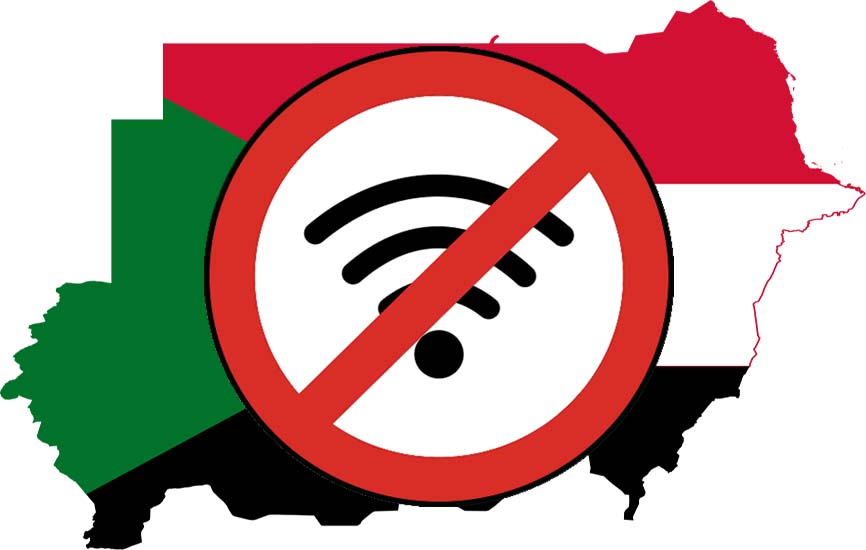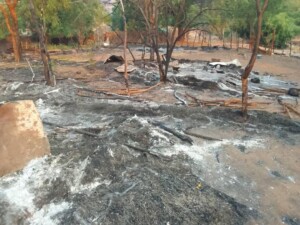Hadhreen: Sudan comms shutdown ‘ordered by army command’

Graphic: RD
The Hadhreen civil society organisation in Sudan claims that “careful investigation and information from reliable sources” shows that “the Sudanese Armed Forces (SAF) leadership directly ordered the shutdown of communication services in large areas of Darfur and Kordofan since the beginning of the war. This was not due to technical problems, as was rumoured.”
Following up on a February 8 statement, accusing the RSF of being behind [or at least perpetuating] the shutdown, the Hadhreen* organisation says it strongly condemns the action by the SAF leadership, “as the first victim is a Sudanese citizen who relies on telecommunications services for daily life. Depriving them of these services is the same crime committed by the Rapid Support Forces (RSF) militia in recent weeks, as it will directly contribute to the worsening of the humanitarian catastrophe.”
As previously reported by Dabanga, Hadhreen, the Sudanese American Medical Association (SAMA), and the Strategic Initiative for Women in the Horn of Africa (SIHA Network) in a joint statement on February 8 condemned the ongoing telecommunications blackout in Sudan.
The organisations accused the RSF of being behind the shutdown, saying the disruption “adds to the many violations that have been committed” since the beginning of the war in mid-April of last year.
“This act constitutes a full-fledged crime against humanity and the rights guaranteed by international laws. It directly threatens the lives of civilians who rely almost entirely on banking applications and other solutions provided by telecommunication companies in their daily transactions.
“It also hinders the delivery of humanitarian aid, which threatens the lives of millions of civilians caught amidst the ongoing war in various parts of the country. In addition, it directly affects freedom of speech and access to information about what is happening on the ground in areas of armed conflict and the rest of Sudan.”
In its latest statement, Hadhreen organisation reiterates its call on the international community to pressure the SAF and RSF leadership to restore services throughout the country.
‘Weapon of war’
In addition to countrywide outages in telecommunications and Internet for weeks, the provision of much-needed relief items has now become a weapon of war, Dabanga correspondent Abdelmonim Idris reported last week.
Both of the warring parties have denied responsibility for the communications blackout and accuse each other.
Many Sudanese accuse the RSF of being behind the current interruption of the Sudani, Zain, and MTN services.
Mohamed El Mukhtar, legal advisor to RSF Commander Mohamed “Hemedti’ Dagalo, denied the accusations earlier this month, saying that the Sudani and MTN companies reported that the services were stopped as a result of technical failures. He accused the Sudanese Air Force of bombing vital sites and infrastructure, including telecommunications companies’ headquarters and towers, in Khartoum state and surroundings.
The more than three-week communications blackout has also forced charity kitchens in the Sudanese capital to close.
The months-long blackout in large parts of Darfur and Kordofan is also a result of the SAF destroying wireless towers while bombing RSF positions, he said.
People in large parts of Darfur and Kordofan are now using the Starlink satellite service, though the connection costs for one hour range from SDG1,000 to SDG3,000.
* Hadhreen emerged as a grassroots initiative in 2015. During the 2018 December revolution that toppled the dictatorship of Omar Al Bashir, it was quick to join the great efforts undertaken by health professionals “to help treat and safe lives of the injured protesters throughout Sudan, and in Khartoum in particular”. The organsation worked to cover the treatment costs of injured activists, collaborated with hospitals and clinics to make treatment available to more victims, formed an independent medical advisory committee, and supported activists in getting treatment abroad if they required specialist support that was not available in Sudan.
When Al Bashir’s regime finally fell and the military took over in a coup in April 2019, the initiative continued to support victims throughout months of violent crackdowns until October 2020 although it rolled back its activities after the formation of two care organisations by victims themselves ensure that the victims’ organisations would have the freedom and space to operate without competition for resources and funding streams.
After the October 2021 military coup, however, Hadhreen had to reinstate its operations. This time in close collaboration with the Central Committee of Sudanese Doctors (CCSD), which would oversee the initial emergency response. Those requiring additional treatment were referred to Hadhreen, which had renewed its contracts with private health providers and public specialised centres, provided unavailable medicines or equipment, and covered the costs of diagnostic tests.
In August 2022, Hadhreen “reluctantly and sadly announced that it is being forced to cease its operations due to the growing indebtedness to private care providers and the progressive drying out of donations and funding streams due to the worsening economic situation in Sudan and globally and the rising costs of healthcare”. Hadhreen handed over the responsibilities to the CCSD “for them to gracefully take on going forward”. They stressed at the time that “despite Hadhreen ceasing operations, we are still actively working to ensure that those injured following the cessation will get as much support and aid possible,” the initiative wrote in their closing statement.











 and then
and then